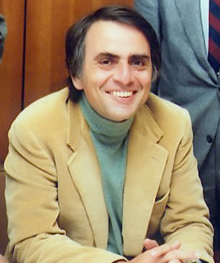Audio-book Review
By Chet Yarbrough
Blog: awalkingdelight)
Website: chetyarbrough.blog
The Dragons of Eden
By: Carl Sagan
Narrated by: JD Jackson, Ann Druyan

Carl Sagan (1934-1996, Author, University of Chicago entry at 16 years of age, received a Master of Science and Doctor of Philosophy in astronomy and astrophysics in 1960.)
Carl Sagan died from a bone-marrow disease at the relatively young age of 62 in 1996. One generally associates Sagan with his Cosmos series, but his education went far beyond the study of astronomy. His book reflects as much on the philosophy of life as the future of society, science, and technology.


Today’s controversial abortion question is forthrightly addressed by Sagan. He suggests “Right to Life” and a “Women’s Right to Choose” are politically and philosophically extreme ends of a rational argument on abortion. “Right to Life” followers insist all life is precious even though humans kill animals for sport and consumption. “Women’s Right to Choose” followers insist birth of a baby in utero is the sole decision of women because their body and life are only theirs to control.
Sagan suggests a baby in utero in the first trimester may be tested for brain activity and if none is found, no personhood is formed. With no brain activity of a baby in utero, the right of a woman to choose is an equal rights decision. However, to Sagan if brain activity is present, life is present, and abortion is murder. Sagan infers a science based national law could be created that avoids the extremist positions of the “Right to Life” and “Women’s Right to Choose” movements.
Though Sagan may have overemphasized the difference between left brain and right brain function, he notes the advances that have occurred in how specific areas of the brain compete and can be electrically stimulated to elicit thought and action.


Sagan notes how computer gaming opens doors to the advance of computer capability and utility.
Nearly 50 years ago, Sagan’s book suggests much of what has happened in the science of brain function and technology. It seems a shorter step from Sagan’s ideas about computer function to what is presently called artificial intelligence. His view of brain and computer function might lead to a machine/brain confluence. It may be that Sagan’s belief in other forms of terrestrial life are secondary rather than primary interests of our human future.
In 1978, Sagan receives the Nobel Prize for nonfiction with “The Dragons of Eden”. In retrospect, it seems a wise decision by the Nobel panel of judges.

